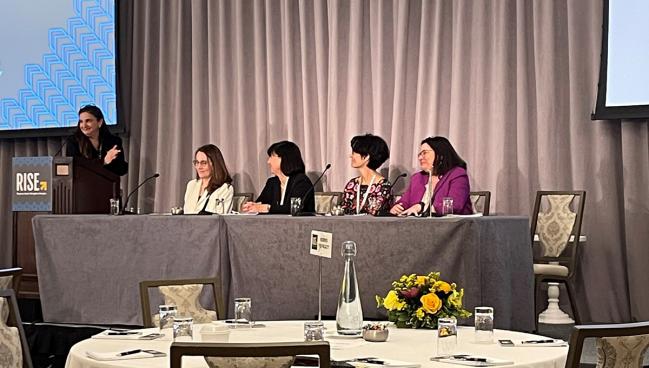Looking Back at the RISE Conference: A Spark Is Lit
A fellow recaps her takeaways from this first-ever Women as One event, inspired to work for change for herself and others.

Upon walking into the Intercontinental Hotel in New York City early on a Saturday morning for the second day of the Women as One RISE Conference, I noted the delicate flowers and chandeliers in the ballroom were balanced by the resilience, courage, and grit that was palpable in the room.
I took a seat at an empty table and was soon joined by two leaders I admire in women's cardiovascular health. Aiming to maintain composure and not show my overwhelming excitement at being so close to these two incredible women, I settled in to pay attention to the speakers.
As Roxana Mehran, MD, co-founder of Women as One, gave the opening remarks, my eyes darted around the room spotting editors of premier medical journals, former presidents of the American College of Cardiology and American Society of Echocardiography, and current chiefs of cardiology at major academic centers. That I was surrounded by successful women is an understatement: they have not only changed how we practice cardiology, but also opened doors for others, like myself, to even consider a career in the field.
Very early into the keynote speech by Sasha Shillcutt, MD, I could feel a shared sense of pride and unity emerge in the room that even I, a mere trainee, felt a part of. Yes, we were all women, but each of us had diverse backgrounds and individual stories that had brought us to that current time and space. Shillcutt’s address reminded us that despite our varying titles and degrees, we are many of us faced with the same harsh realities of the workplace: the gender pay gap, daily microaggressions, a dearth of women in leadership, and a filter applied to our contributions and opinions based on sex and gender.
Shillcutt’s talk was informative and eye opening for me, offering clues to what I may face ahead in my career journey, as well as a glimpse of how archaic our current work environment is today. As she spoke, many of us were nodding, taking photos, and laughing along with experiences she shared, leaving us united by a passion to change the antiquated gender roles that dominate in our field. I had made the decision to travel direct from the CCU to attend this conference in my precious spare time—this was the dose of adrenaline I needed.
Throughout the day, I attended talk after talk, each offering a different kind of inspiration. One discussion inspired me to consider how I might take the leap with my ongoing, single-center nutrition project to potentially turn it into a multicenter study. I was blown away by the multiple research and funding opportunities available for women and quickly jotted down the names of programs in my notebook.
Yet another panel made up of pharmaceutical and medical device company leaders explored how women can be better brought into trial leadership roles. Later, I listened as five female chiefs of cardiology discussed what they overcame to gain their titles and how all women should consider themselves as future chiefs. At the end of these discussions, I felt both hope and possibility. Up until now, I had never thought much about becoming a leader or even applying for research resources, but the raw, unfiltered guidance and support these leaders gave the audience that day has truly inspired me to do both.
Another keynote session led by entrepreneur and author Eric Collins challenged us to brainstorm solutions for how to improve patient outcomes in underserved communities and how to recruit more women into our male-dominated fields. I was excited to hear the approaches more-seasoned women would take to make a large impact in their community and what barriers they see in recruiting more women. Additionally, some international attendees shared ideas about how to help encourage more young women to pursue medicine and thoughts on how to improve healthcare disparities through increasing internet access and community outreach programs. It was humbling to recognize a common, cross-cultural theme across a wide swath of health, gender, and race disparities: access.
During the lunch break, I attended a workshop designed to provide me with skills to help achieve the goals discussed during the morning sessions, including how to be a more effective writer, how to get my work published in high-impact journals, and lastly, ways for physicians to improve their business acumen.
Actor and gender equity in media advocate Geena Davis gave the day’s final keynote speech that tied everything together for me. She was funny, encouraging, and surprisingly relatable, sharing with us how her success was a result of her resilience, persistence, and the support she received from her family to pursue such a grueling and sometimes hostile career for a woman. Her own experience with gender disparities in Hollywood inspired her to address pervasive problems of how women and girls are portrayed in film and television.
Her speech resonated with me. In unexpected ways, a movie star’s endurance, passion, and perseverance did not seem too different from my own experience, pursing my dream of becoming a cardiologist. Davis made me wonder: how was I going to change the narrative to promote gender equality in medicine?
At the end of the day, a spark had been lit in the room that hadn’t been there that morning. The RISE conference not only provided me with insights into my full potential and the skills and resources I needed to get there, but also pushed me to think about how I could connect with a network of phenomenal women to work towards a day where cardiology is an equitable field for men and women, both as physicians and patients.
L. Nedda Dastmalchi, DO, MA, is a second-year general cardiology fellow at Temple University Hospital (Philadelphia, PA). She studied medical…
Read Full Bio




Comments